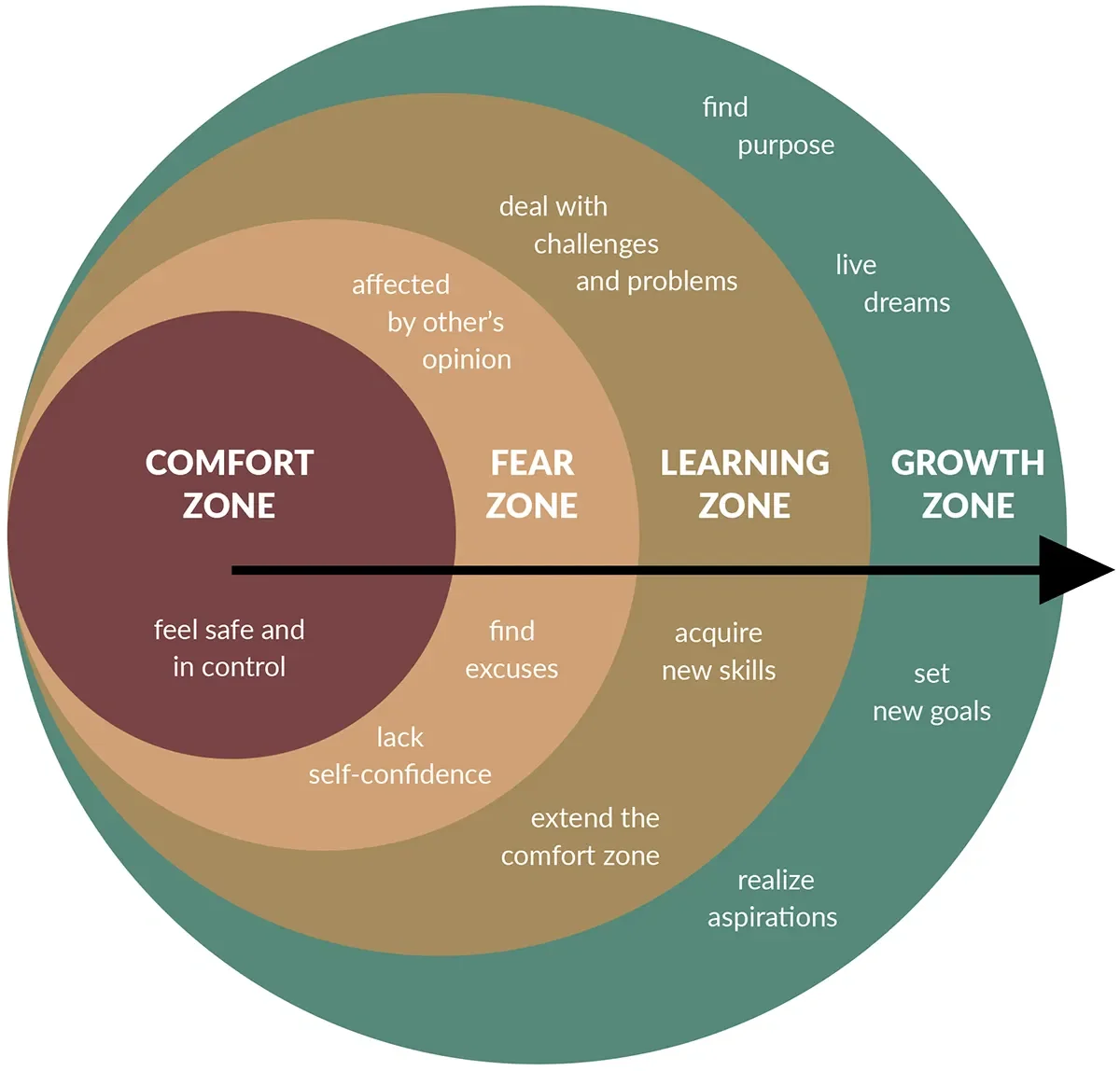Stepping Out of Your Comfort Zone: How to Build Your Confidence in English at Work
For me, the different zones are not perfect circles, but loose boundaries which are flexible, with practice you feel more able to step in and out of each zone when needed.
When I coach professionals who want to improve their English, one theme comes up again and again: confidence. Many of my clients tell me,
“I know the grammar and the vocabulary, but when it comes to speaking up in meetings, I stay quiet.”
If that sounds familiar, you’re not alone. I’ve heard the same worry from engineers, managers, and specialists across industries. Luckily, we can all build our confidence step by step, by moving through different “zones” of growth.
In my previous blog post, Dare to Be Adventurous: How Stepping Out of Your Comfort Zone Builds English Confidence, I wrote to encourage you to step out of your comfort zone and try a challenge. Of course, this is easy to say but more difficult to put into action. Read on to find some reflection questions for getting you out of your comfort zone.
What is your comfort zone?
This idea goes back to the work of management thinker Judith Bardwick, who first described the “comfort zone” as:
“a behavioral state within which a person operates in an anxiety-neutral condition, using a limited set of behaviors to deliver a steady level of performance, usually without a sense of risk.”
Judith M. Bardwick, “Danger in the Comfort Zone: From Boardroom to Mailroom — How to Break the Entitlement Habit That’s Killing American Business”. (1991)
German educator Tom Senninger later expanded this into the Learning Zone Model, which outlines four stages: comfort zone, fear zone, learning zone, and growth zone.
Source: PositivePsychology.com Toolkit – ‘Leaving The Comfort Zone’
Here’s how I see these zones play out in language learning at work, along with some of the questions I ask my clients to help them move forward.
Comfort Zone: Safe but Stuck
Three questions for you to ask yourself about your comfort zone in English.
Many clients begin here. They can handle greetings, polite standard phrases, and basic tasks, but they avoid anything that feels risky, like sharing ideas in a meeting. It feels safe, but also frustrating, because they know they’re capable of more. The comfort zone feels good because it’s familiar but staying here means your English doesn’t improve.
Ask yourself:
What situations at work feel easy for me in English right now?
Where am I playing it safe in English at work?
What opportunities might I miss if I stay here?
Fear Zone: Facing Your Nerves
Three questions to help you through your fear zone.
The moment you step out of comfort, fear kicks in. Clients often tell me about their racing heartbeat before presentations or worrying about forgetting a word mid-sentence. I remind them: this stage is not failure, it’s proof you’re moving forward.
Ask yourself:
What situations trigger my nerves in English?
How do I usually react when I make a mistake?
What would change if I saw fear as a sign of growth, not weakness?
Learning Zone: Progress Through Practice
Three questions to get you into the learning zone.
This is where progress happens. I’ve seen clients experiment with new vocabulary in meetings, ask clarifying questions, or volunteer to lead a small section of a presentation. Mistakes happen, but we treat them as data, not disasters.
Ask yourself:
How could I challenge myself just a little this week?
What’s one situation this week where I could try a new word or phrase?
How can I turn mistakes into lessons instead of frustration?
Growth Zone: Confidence Earned
Three questions to help your move into the growth zone.
Over time, courage turns into confidence. One client who used to avoid speaking in meetings now contributes ideas freely and even mentors colleagues in English. That’s the growth zone: using language not just to survive, but to lead and connect.
Ask yourself:
What does “success in English” look like for me?
How would stronger English skills change my career path?
When I imagine myself at my best in English, what am I doing and saying?
As Atomic Habits author James Clear puts it (sign up for his excellent newsletter here):
“The only way to develop true confidence is to earn it… In the beginning, you need enough courage to practice even though it may not go very well. And over time, as your skills improve, courage transforms into confidence. Courage first, confidence later.”
The journey from comfort to growth is not a straight line. There will be peaks, plateaus, and even times when you go back to your comfort zone for a while. That’s normal. What matters is that you keep stepping forward, even when it feels uncertain.
Every time you practice English in real situations, you’re not just learning a language, you’re building courage. And with courage, confidence always follows.
Looking for an English language coach to help you find your courage to step out of your comfort zone? Book a free 15-minute discovery call with me to chat about how I could support you or your team. ⬇️
Hello,
I’m Jane Carvell, a business English trainer, language coach and visual thinking enthusiast. I help German-speaking professionals improve their English communication skills, so that they can build better connections in an international working world.







